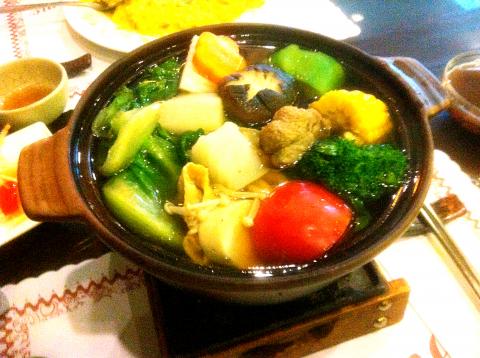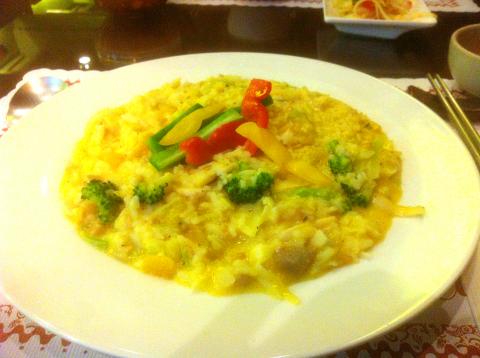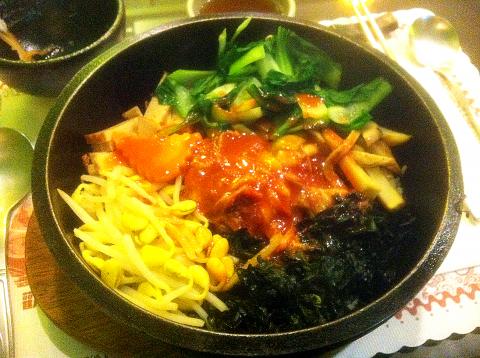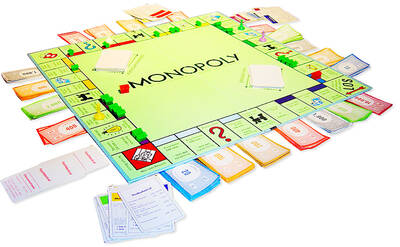Taipei offers a fair number of vegetarian restaurants, but the choices get old pretty fast. Most places are either cheap cafeterias or expensive buffets, and the food is often bland or decent but overpriced.
Hopefully more shops like Vegi Garden (植善蔬食多國料理) will continue to pop up across the city. Located near Taipei Main Station behind the Shin Kong Mitsukoshi Building (新光三越), the restaurant strikes a nice balance between the budget cafeteria and the fancy buffet.
The menu, which includes pastas, risotto-type dishes and Asian-style noodles, is neither fancy nor chic. But everything I’ve had there was prepared very well and made with fresh ingredients.

Photo: David Chen, Taipei Times
The reasonable prices, averaging around NT$200 per meal, will encourage you to return if you happen to be in the neighborhood. Better yet, Vegi Garden is a nice place to sit and have a meal, sporting a Thai-style decor with lime green walls and wooden floors.
The wait staff will recommend the Mushroom and Wild Vegetables Hot Pot (猴頭菇野菜鍋, NT$260) as their signature dish. I wasn’t blown away, but I did find it to be just the right thing for a chilly day.
The steaming mini-cauldron arrives loaded with several types of mushrooms, including the meaty-textured lion’s mane mushroom (猴頭菇, literally “monkey’s head mushroom”), and a wide variety of leafy greens and root vegetables. As with all things hot pot, the magic is in the broth, and Vegi Garden’s favors subtlety of flavor over heartiness. Small amounts of ginger and basil give this broth a quiet zing.

Photo: David Chen, Taipei Times
For all of the homemade goodness, the overall flavors and ingredients used in Vegi Garden’s food cater to su (素, vegetarians), which means there will be a certain blandness attributed to the lack of garlic, onion, leeks and other strong-flavored foods that some Buddhists avoid for fear of overstimulating the body and mind.
But that’s not necessarily a bad thing, and the other dishes I had were anything but bland. If you like Korean food, don’t hesitate to order the bibimbap, which the menu dubs “Korean stone pot stirred rice” (韓式石鍋拌飯, NT$200). This sizzling bowl is loaded with what one would normally expect: veggie greens, bean sprouts, several kinds of tofu (including fake meat), mushrooms, kimchi and hot sauce.
You can ask for your desired level of heat with your hot sauce, but be aware that Vegi Garden errs on the spicy side. I asked for xiaola (小辣, slightly spicy), and still found myself wiping sweat from my brow after lunch. But I would definitely stop in again for this dish, as it beats comparable offerings at the run-of-the-mill food court by a long mile, vegetarian or not.

Photo: David Chen, Taipei Times
In Mandarin, Vegi Garden calls itself a “multi-national” restaurant (多國料理), offering “European” dishes such as “marine wild mushroom baked penne pasta” (海洋野菇焗麵, NT$220). I decided not to risk being disappointed and skipped this dish, but was pleasantly surprised when I had a bite of my dining companion’s pumpkin mushroom stewed rice (南瓜蘑菇燉飯, NT$190), which had a buttery-rich flavor.
The restaurant also makes its own noodles, with a Japanese wild mushroom (日式野菇拉麵) and a Thai-style sweet and sour ramen (泰式酸辣拉麵) for NT$180 each.
For an additional NT$80, you can turn any dish into a set meal, which includes hot herbal tea and small side dish. If you have the appetite and time to spare, it’s worth it. The side dish on my last visit was a fresh and tasty Thai-style papaya salad, a novel touch from a novel vegetarian restaurant.

With one week left until election day, the drama is high in the race for the Chinese Nationalist Party (KMT) chair. The race is still potentially wide open between the three frontrunners. The most accurate poll is done by Apollo Survey & Research Co (艾普羅民調公司), which was conducted a week and a half ago with two-thirds of the respondents party members, who are the only ones eligible to vote. For details on the candidates, check the Oct. 4 edition of this column, “A look at the KMT chair candidates” on page 12. The popular frontrunner was 56-year-old Cheng Li-wun (鄭麗文)

“How China Threatens to Force Taiwan Into a Total Blackout” screamed a Wall Street Journal (WSJ) headline last week, yet another of the endless clickbait examples of the energy threat via blockade that doesn’t exist. Since the headline is recycled, I will recycle the rebuttal: once industrial power demand collapses (there’s a blockade so trade is gone, remember?) “a handful of shops and factories could run for months on coal and renewables, as Ko Yun-ling (柯昀伶) and Chao Chia-wei (趙家緯) pointed out in a piece at Taiwan Insight earlier this year.” Sadly, the existence of these facts will not stop the

Oct. 13 to Oct. 19 When ordered to resign from her teaching position in June 1928 due to her husband’s anti-colonial activities, Lin Shih-hao (林氏好) refused to back down. The next day, she still showed up at Tainan Second Preschool, where she was warned that she would be fired if she didn’t comply. Lin continued to ignore the orders and was eventually let go without severance — even losing her pay for that month. Rather than despairing, she found a non-government job and even joined her husband Lu Ping-ting’s (盧丙丁) non-violent resistance and labor rights movements. When the government’s 1931 crackdown

The first Monopoly set I ever owned was the one everyone had — the classic edition with Mr Monopoly on the box. I bought it as a souvenir on holiday in my 30s. Twenty-five years later, I’ve got thousands of boxes stacked away in a warehouse, four Guinness World Records and have made several TV appearances. When Guinness visited my warehouse last year, they spent a whole day counting my collection. By the end, they confirmed I had 4,379 different sets. That was the fourth time I’d broken the record. There are many variants of Monopoly, and countries and businesses are constantly